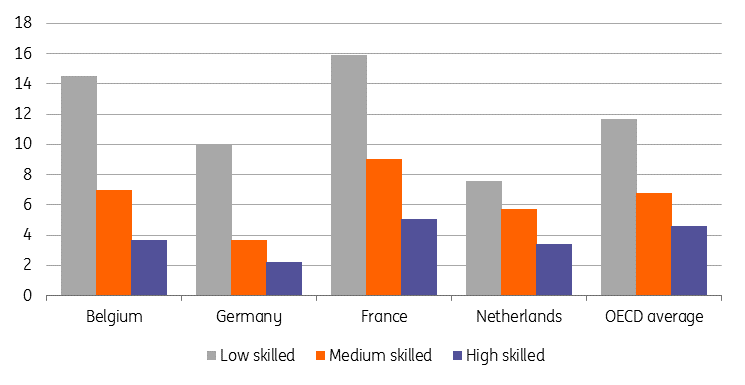Belgian jobs deal: We want more!
It has been THE hot topic of the Belgian government’s summer deal: 28 measures were decided to further improve the functioning of the labour market and, finally, employment. Some could have a real impact, but in our view, in order to durably solve the labour market problem in Belgium, more reforms are necessary
Moves in the right direction
Among the recently decided measures, we highlight the decreasing path of unemployment benefits across time, special training budgets for people losing their job and special effort to reduce the lack of qualified job seekers in certain sectors (IT, nurses,…). The Belgian government expects these measures to create 12,500 additional jobs in 2019, implying a half billion euro reduction in the public deficit.
While we don't consider this an unreachable target, we have some doubts about the ability of such measures to solve the labour market problem in Belgium. They certainly go in the right direction, but erasing high structural unemployment requires much stronger reforms.
In fact, the Belgian labour market suffers from two main problems:
There are too many unqualified job seekers
On average, there were 500,000 job seekers in Belgium between July 2017 and June 2018. Half of them (!) were low skilled (having only a partial secondary school education at best). Moreover, the unemployment rate of low-skilled people in Belgium (14.5% in 2016) is far higher than the OECD average (11.7%), while it is similar for intermediate-skilled people and below the OECD average for high-skilled people (3.7% in Belgium, 4.6% in OECD). In other words, the Belgian labour market is not able to absorb low-skilled job seekers. This is no surprise considering the rigidity of the Belgian labour market and high labour costs. It also explains while many vacancies are not fulfilled, even with half a million job seekers.
In this context, developing training programmes focused on sectors where there are labour shortages is far from easy, as these programmes need basic knowledge and would probably only be accessible for medium-skilled jobseekers. Given the reality of unemployment, reducing labour shortages requires a deeper effort, starting by improving the basic skills of half the job seekers. Alternatively, new jobs for low-skilled people could be created, but this would mean a drastic reduction in the labour cost for this type of job (e.g by lowering the minimum wage), which would be hard to push through.
Unemployment rate by level of qualification (2016)

Only six out of 10 people aged between 50 and 64 years are employed
This is due to a (past) very generous early retirement system and to an age-related automatic wage increase system. The government is trying to correct this by reducing the accessibility to the early retirement system and by trying to break the link between age and wage. Once again, these are moves in the right direction, but we doubt that this will be sufficient. A cultural revolution (among workers and businesses) would be needed to have a different approach towards careers after 50: let’s remember here that surveys show more than two-thirds of workers don’t want to work after age 60 and that the effective average retirement age is still around 60 in Belgium. The process to change this situation will be, once again, very long and will require more than financial penalties or incentives.
Download
Download opinion
3 August 2018
In case you missed it: One hike, one tweak, one hold This bundle contains 7 articles
Philippe Ledent
Philippe Ledent is a Senior Economist at ING Belgium. He’s responsible for economic scenario and structural research on Belgium and Luxembourg. Philippe also teaches in French and Belgian universities and since 2009 has been a regular columnist in the Belgian economic review. Previously, he worked at the Catholic University of Louvain.
Philippe Ledent
This publication has been prepared by ING solely for information purposes irrespective of a particular user's means, financial situation or investment objectives. The information does not constitute investment recommendation, and nor is it investment, legal or tax advice or an offer or solicitation to purchase or sell any financial instrument. Read more
